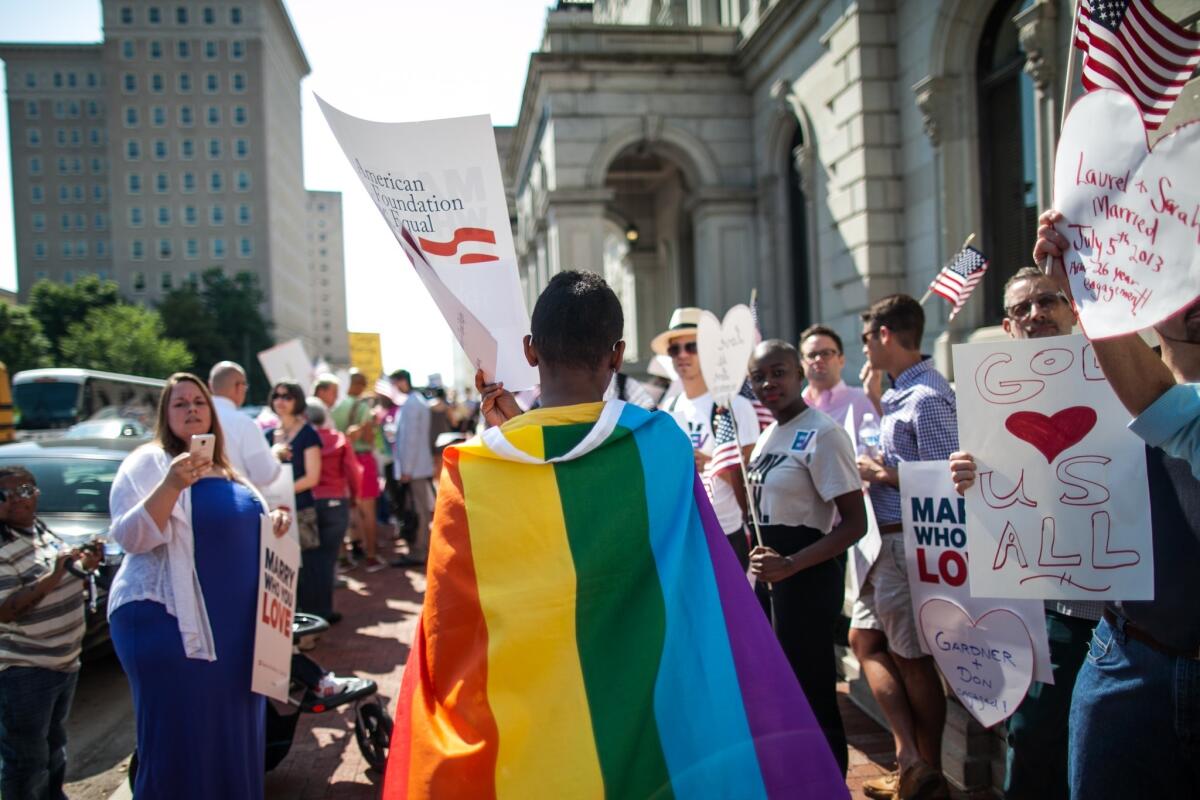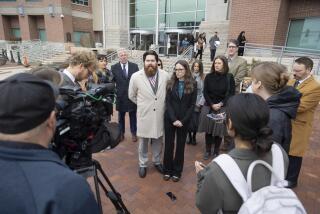Appeals court appears split in Virginia same-sex marriage case

Hundreds of protesters gathered outside the U.S. 4th Circuit Court of Appeals in Richmond, Va., on Tuesday as a three-judge federal appellate panel heard arguments on the state’s same-sex marriage ban.
The panel appeared divided over a lower court ruling that struck down Virginia’s constitutional amendment barring such unions. Voters approved the amendment in 2006.
Advocates for same-sex marriage liken the state bans to those that were in place before the U.S. Supreme Court, in a Virginia case, struck down prohibitions on interracial marriage in 1967. They contend the state prohibition violates the rights of same-sex couples to be treated equally under the federal Constitution.
Circuit Judge Roger L. Gregory seemed to back that interpretation. In his questions to lawyers, he mentioned the current case and the interracial one in the same breath.
“The essence of marriage is the individual’s choice to marry the person they choose,” said Gregory, according to a report from the Washington Post, which produced an ongoing blog on the proceedings.
Judge Paul V. Niemeyer countered that the fundamental right to marriage that the Supreme Court has recognized as constitutionally protected is a “union of husband and wife.” Same-sex relationships, he argued, are different because they are unable to produce children. “It doesn’t work biologically.”
That argument has been used in other courts, where some parties have argued that the state has a right to insist that marriage be exclusively between a man and a woman because of the need to produce and care for children.
Same-sex marriage advocates have argued that gay parents can care for children just as well as heterosexual parents, and have noted that heterosexual couples don’t necessarily have children.
The third judge on the panel, Henry F. Floyd, largely stayed out of the fray, according to the Washington Post blog.
It is not known when the appellate court will rule. A similar appellate case, involving bans in Utah and Oklahoma, is pending in the U.S. 10th Circuit Court of Appeals in Denver.
It is not unusual for the Supreme Court to wait and see how lower courts around the nation deal with an issue before deciding whether to combine the cases and issue a ruling.
Last summer, the Supreme Court struck down part of the federal Defense of Marriage Act, which opened the gates to a variety of lawsuits on issues involving same-sex marriage. Federal judges have used the court’s reasoning in the DOMA case to strike down bans in Utah, Oklahoma, Virginia, Texas and Michigan. Additionally, judges in Kentucky, Tennessee and Ohio have said those states must recognize gay marriages performed elsewhere.
In the Virginia case, Timothy Bostic and Tony London were denied a marriage license at Norfolk Circuit Court on July 1, 2013. They sued, arguing that gays and lesbians are being denied equal protection of the law and rights guaranteed by the 14th Amendment because of Virginia’s constitutional ban on gay marriage.
On Feb. 13, just in time for Valentine’s Day, a federal judge in Norfolk struck down the state constitutional amendment. In her ruling, U.S. District Judge Arenda L. Wright Allen compared the ban on same-sex marriage to Virginia’s past prohibition on interracial marriage, which the Supreme Court used to end bans on interracial marriage across the country.
“My clients have a second-class relationship,” said Ted Olsen, arguing on behalf of Bostic and London, who were denied a license by court clerk George Schaefer. “The right to marriage is fundamental for all people,” Olsen said, according to reports from the courtroom.
Arguing for Schaefer, attorney David Oakley said that Virginia’s constitutional ban on same-sex marriage “does not violate the 14th Amendment for equal protection.” Oakley said that under the federal system, “states have the right to regulate marriage.”
Judge Floyd noted that “states can’t trample on the 14th Amendment.”
Currently, 18 states and the District of Columbia allow gay marriage.
More to Read
Start your day right
Sign up for Essential California for news, features and recommendations from the L.A. Times and beyond in your inbox six days a week.
You may occasionally receive promotional content from the Los Angeles Times.







